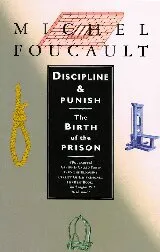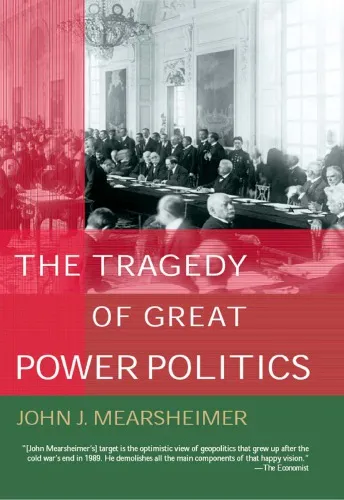Discipline and Punish: The Birth of the Prison
4.6
بر اساس نظر کاربران

شما میتونید سوالاتتون در باره کتاب رو از هوش مصنوعیش بعد از ورود بپرسید
هر دانلود یا پرسش از هوش مصنوعی 2 امتیاز لازم دارد، برای بدست آوردن امتیاز رایگان، به صفحه ی راهنمای امتیازات سر بزنید و یک سری کار ارزشمند انجام بدینکتاب های مرتبط:
معرفی کتاب 'Discipline and Punish: The Birth of the Prison'
در این اثر بیبدیل، به بررسی تاریخی و فلسفی تحولات حقوقی و اخلاقی میپردازیم که از دوران قرون وسطی تا به امروز، نه تنها جنبههای کیفری و جزایی، بلکه ساختارهای اجتماعی و سیاسی قدرت را تحت تاثیر قرار دادهاند.
خلاصهای از کتاب
کتاب 'Discipline and Punish: The Birth of the Prison' اثر میشل فوکو، مروری جامع و ژرفنگرانه بر تغییرات اساسی در نحوه مدیریت مجازات و کنترل اجتماعی از قرون وسطی تا عصر مدرن ارائه میدهد. فوکو با استفاده از بررسی تاریخی و تحلیل نظری، تحول از شیوههای سنتی مجازات بدنی به سیستمهای پیچیده نظارت و پیشگیری را تحلیل میکند. او نشان میدهد که چگونه قدرت نه تنها از طریق اعمال قدرت مستقیم بلکه از طریق ساختارها و نهادهایی چون زندان و بیمارستان اعمال میشود.
نکات کلیدی
- افول مجازاتهای بدنی و ظهور حبس به عنوان فرم اصلی مجازات.
- ظهور نهادهای انضباطی مانند مدارس، زندانها و بیمارستانها به عنوان ابزارهای کنترل اجتماعی.
- نقش قدرت و دانش در ساختارهای نظارتی و انضباطی.
- تحلیل مفهوم "panopticism" و تاثیر آن بر سیستمهای نظارتی مدرن.
جملات مشهور کتاب
یکی از جملات معروف این کتاب این است: "ما باید از بسط قدرتهای انضباطی نه برای مجازات بلکه برای نظارت و اصلاح رفتار آگاه باشیم." این جمله نویسنده به صراحت نشان میدهد که فوکو به چالشی فراتر از باورهای مرسوم درباره قدرت و نظارت میپردازد.
چرا این کتاب اهمیت دارد
این کتاب نه تنها به دلیل نگاه نوین خود به تحول تاریخی مجازاتها و سیستمهای کیفری اهمیت دارد، بلکه به دلیل تحلیل فلسفی و انتقادیاش از مفهوم قدرت و حکومت بر انسانها باعث شده است که از آن به عنوان یکی از آثار بنیادین فلسفه سیاسی مدرن یاد شود. فوکو با برجسته کردن اهمیت نقش قدرت در نظامهای اجتماعی و سیاسی، به مخاطب ابزاری برای فهم دقیقتر و کاملتر تغییرات ساختاری ارائه میدهد.
Introduction
Michel Foucault's "Discipline and Punish: The Birth of the Prison" is a profound exploration of the transition in societal punishment methods from medieval public executions to the modern penitentiary system. First published in 1975, this seminal work examines how the modern penal system came into being, transforming not just systems of punishment, but also broader conceptions of power, discipline, and social control.
Detailed Summary of the Book
The book starts with a stark juxtaposition of two historical penal practices: the gruesome public torture and execution of regicide Robert-François Damiens in 1757, and a regimented timetable from a 19th-century prison. Through this contrast, Foucault illustrates the shift from a focus on the body in punishment to a more psychological approach aimed at reforming the soul. In this context, Foucault examines the development of disciplinary methods and explores how these techniques of power extended beyond prisons to various societal institutions like schools, hospitals, and the military.
Foucault identifies the rise of a "disciplinary society," where power is exercised through subtle forms of surveillance rather than direct force. The panopticon, an architectural model of a circular prison designed by Jeremy Bentham, serves as a powerful metaphor for modern surveillance and social control. With its ability to watch all inmates without them knowing when they're being observed, the panopticon exemplifies how disciplinary power operates through continuous monitoring and normalization.
Foucault also delves into the creation of a "docile body," which is produced through meticulous exercises, hierarchized surveillance, and comprehensive accountings. The penal system is seen as a microcosm for broader society, reflecting power dynamics that shape and control individuals. Discipline, as Foucault articulates, becomes a general formula of domination characterized by constant surveillance and a normalization of behavior.
Key Takeaways
- The transformation of punishment from public spectacle to private penitence reflects broader shifts in social control methods.
- Modern power is decentralized, relying on surveillance and internalized self-regulation rather than overt displays of power.
- Disciplinary systems are not confined to penal institutions but permeate various social structures such as education and health care.
- The concept of the panopticon is emblematic of modern surveillance, illustrating how visibility is integral to power and control.
Famous Quotes from the Book
"The body is the surface of the inscription of events."
"Visibility is a trap."
Why This Book Matters
This book is crucial for understanding the mechanics of power in modern society. It offers a critical lens to examine how authority and discipline are exerted not through force or coercion, but through subtle means of surveillance and control. Foucault's insights into the nature of power and its operations penetrate far beyond the walls of the prison, affecting contemporary debates on privacy, security, and the surveillance state. The book remains a pivotal text in fields such as sociology, history, criminology, and political science, providing a framework to critique and comprehend the complexities of power in social institutions.
دانلود رایگان مستقیم
شما میتونید سوالاتتون در باره کتاب رو از هوش مصنوعیش بعد از ورود بپرسید
دسترسی به کتابها از طریق پلتفرمهای قانونی و کتابخانههای عمومی نه تنها از حقوق نویسندگان و ناشران حمایت میکند، بلکه به پایداری فرهنگ کتابخوانی نیز کمک میرساند. پیش از دانلود، لحظهای به بررسی این گزینهها فکر کنید.
این کتاب رو در پلتفرم های دیگه ببینید
WorldCat به شما کمک میکنه تا کتاب ها رو در کتابخانه های سراسر دنیا پیدا کنید
امتیازها، نظرات تخصصی و صحبت ها درباره کتاب را در Goodreads ببینید
کتابهای کمیاب یا دست دوم را در AbeBooks پیدا کنید و بخرید
1449
بازدید4.6
امتیاز0
نظر98%
رضایتنظرات:
4.6
بر اساس 0 نظر کاربران
Questions & Answers
Ask questions about this book or help others by answering
No questions yet. Be the first to ask!















